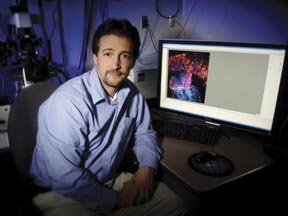A cell biologist from UAB is part of a team of scientists that restored the sense of smell using gene therapy in mice that had been engineered to lack it. The authors noted that the finding has the potential to lead to future treatments for genetic syndromes that interfere with the ability to smell, along with conditions throughout the body caused by related cellular mechanisms.
 Bradley Yoder, Ph.D., professor within the UAB School of Medicine’s Department of Cell, Developmental and Integrative Biology, was among the authors of the related article published in Nature Medicine.
Bradley Yoder, Ph.D., professor within the UAB School of Medicine’s Department of Cell, Developmental and Integrative Biology, was among the authors of the related article published in Nature Medicine.
Led by researchers at Johns Hopkins and the University of Michigan, the research team was able to cure the mice of congenital anosmia — the medical term for an inability to detect odors from birth. The mice were unable to smell because they had been born without cilia, the hair-shaped structures that grow on the surfaces of most cells in body and that have emerged as major players in many diseases, as well as healthy function.
Researchers restored olfactory function through gene therapy — infecting the mice with a virus designed to make specific genetic changes. These alterations coaxed nerve cells that transmit the sense of smell to regrow the cilia they were missing.
The study authors note that the research may become important for other cilia-related diseases, including polycystic kidney disease, retinitis pigmentosa in the eye, and rare disorders like Alström syndrome, Bardet-Biedl syndrome and nephronopthisis.
The researchers caution that the work in mice will not have immediate implications for humans who have lost the ability to smell, and will be most important first for people with genetic disorders. Whether or not the findings help those who have lost their sense of smell to aging, head trauma or chronic sinus problems is a matter for future research.
The study was funded by the National Institute on Deafness and Other Communications Disorders, the National Institute on Diabetes and Digestive and Kidney Diseases, the Eunice Kennedy Shriver National Institute of Child Health and Human Development, and the National Eye Institute.